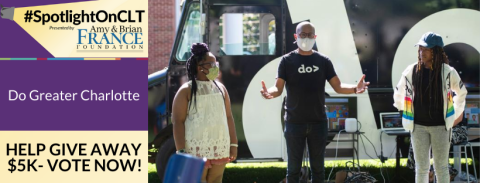#SpotlightOnCLT: Do Greater Charlotte
Nonprofit Leader Helps Grow Tech Talent in Underserved Youth
By Jonathan McFadden
Two things changed William McNeely’s life when he was just a teenager: court-ordered busing and a mother who took success seriously.
As school integration got underway in the 1970s, William and his three siblings, raised in Charlotte’s Clanton Park neighborhood, stepped into a more affluent world as students at South Mecklenburg High. While jarring, their trek from Charlotte’s poorer westside to its wealthier southern sector exposed them to resources they didn’t get at home.
At the same time, their mother pushed them to play sports, study music and join the ROTC — whatever it took to leverage their new opportunities into good careers. That way, they’d do well in life and return to uplift their community.
Her rearing paid off. Today, William, 56, is the executive director of Do Greater Charlotte, a nonprofit that helps middle school-age children boost their technological knowhow in hopes of improving their chances to succeed.
A former Apple executive who marketed tech to Charlotte schools, William founded the organization to give children living in the city’s poorest communities the same competitive advantage as their wealthy peers.
“Really, the foundation is a mechanism for us to empower communities to do greater things,” he said. “We do that by facilitating exposure and access to creativity, technology and entrepreneurship. We feel that if these communities have [that] access, they can move up the ladder economically.”
Upward mobility has been a major talking point in Charlotte since 2014, when a study showed that poor children here have the worst chances of escaping poverty than in any of the other 49 cities evaluated. To address those inequities, an opportunity task force met for months and issued a series of recommendations. But, depending on who you ask, there’s been little progress to ensure Charlotte’s poor advance economically.
Do Greater Charlotte turns ideas for achievement into action by teaching youth skills that could jettison them to greater opportunities, just like the ones William got when he was their age. One of its most effective outreach tools has been the CRTV Lab, a mobile creative lab where students learn to use iPads, laptops, smart TVs and other gadgets inside a refurbished Snyder’s-Lance truck.
William and his wife, Sheila, coordinate with schools and neighborhood groups to park the truck in a community where high-tech tools are in short supply. They invite children to tinker with the tech and learn how to use an array of devices to build websites, manipulate code, run online businesses and more.
“We tell the kids that if they have access and exposure to this type of tech and training, they can do and be anything they want,” William said.
He hopes that message resonates especially with youth whose ZIP codes often determine how much they’re able to accomplish. That’s why he started the nonprofit — to take the learning and creative opportunities available with tech to people without access to it.
“It doesn’t matter where you live or where you are, all of us have potential,” he said. “That potential just has to be nurtured.”
‘…My time wasn’t up here’
Do Greater Charlotte has been influential but getting here didn’t come easily. In 2016, a year before starting the nonprofit, William was diagnosed with idiopathic pulmonary fibrosis, a lung disease without any known cause.
As his condition worsened, he left his corporate job and began hauling an oxygen tank wherever he went. In 2018, his health “fell off a cliff,” he said. The next year, he put Do Greater Charlotte on hold after being sent to Duke University Hospital in Durham to await a double lung transplant. At one point, doctors said he might not survive the procedure. At another, they inferred he might not survive the next two weeks.
His faith in God, he said, kept him alive. “I believed…my time wasn’t up here,” he said. “I understood my purpose and I understood my purpose had not been fulfilled yet.”
He was right. The eight-hour surgery was a success and William returned to Charlotte after just three weeks of rehab. He revived plans for Do Greater Charlotte and soon received a $250 micro-grant to fund the first iPad for the mobile creative lab. From there, he raised $4,000 to buy a decommissioned delivery truck and then another $16,000 in two months to fully refurbish it.
Although running the mobile lab has been stymied in the wake of the pandemic, William says he and Sheila have developed ways to reach even more young people. That includes partnering with the Arts & Science Council to deliver entrepreneurship programs online, he said. They’re also working with Shiloh Institutional Baptist Church in the Camp Greene neighborhood to convert 4,500 square feet of space inside the church into a co-working and co-learning lab for youth.
“It’s a lot (more) than just giving someone technology,” William said. “It’s showing them what they can do with it. We see these kids’ eyes light up because now they’re exposed to these opportunities.”
How you can help
Do Greater Charlotte is accepting donations to add more tech to its mobile creative lab and finish converting part of Shiloh Institutional Baptist Church into a co-working space. For more information, reach out to William McNeely at wm@dogreater.org.
VOTE NOW: Do Greater Charlotte is in the running to win $5K this month thanks to the Amy and Brian France Foundation who have partnered with SHARE Charlotte for this year’s Spotlight Series and YOU can help when you VOTE NOW! You can also check out the other organizations eligible to win this month’s prize, here!




